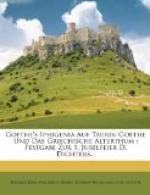They gather round to view the stranger guest!
Who are yon troop in high communion met,
Like an assembl’d family of princes?
They mingle peacefully, of every age,
And either sex, yet are their godlike forms
Cast in a kindred mould. ’Tis they, ’tis they,
The fathers of my race! With Atreus,
In friendly converse glides Thyestes’ shade,
And children playfully around them sport.
Is there no enmity among you now?
And is revenge extinguish’d with the sun?
I then am welcome, and may hope to join
Your solemn company. My fathers, hail!
Orestes, last descendant of your race,
Salutes you. What ye sow’d, that hath he reap’d
Laden with curses he descends to you.
But burdens here are lighter far to bear.
Receive him, oh, receive him in your circle!
Thee, Atreus, I revere, and thee, Thyestes:
Here all are free from enmity and hate.—
Show me my father, whom I only once
In life beheld.—Art thou my father, thou,
My mother leading thus familiarly?
Dares Clytemnestra reach her hand to thee;
Then may Orestes also draw near her,
And say, behold thy son!—My ancestors,
Behold your son, and bid him welcome here,
Among the sons of ancient Tantalus,
A kind salute on earth was murder’s watchword,
And all their joys commence beyond the grave.
Ye welcome me! Ye bid me join your circle!
Oh, lead me to my honour’d ancestor!
Where is the aged hero? that I may
Behold the dear, the venerable head,
Of him, who with the gods in council sat.
You seem to shudder and to turn away?
What may this mean? Suffers the godlike man?
Alas! the mighty gods, with ruthless hate,
To his heroic breast, with brazen chains,
Have cruel pangs indissolubly bound.
Who are yon troop in high communion met,
Like an assembl’d family of princes?
They mingle peacefully, of every age,
And either sex, yet are their godlike forms
Cast in a kindred mould. ’Tis they, ’tis they,
The fathers of my race! With Atreus,
In friendly converse glides Thyestes’ shade,
And children playfully around them sport.
Is there no enmity among you now?
And is revenge extinguish’d with the sun?
I then am welcome, and may hope to join
Your solemn company. My fathers, hail!
Orestes, last descendant of your race,
Salutes you. What ye sow’d, that hath he reap’d
Laden with curses he descends to you.
But burdens here are lighter far to bear.
Receive him, oh, receive him in your circle!
Thee, Atreus, I revere, and thee, Thyestes:
Here all are free from enmity and hate.—
Show me my father, whom I only once
In life beheld.—Art thou my father, thou,
My mother leading thus familiarly?
Dares Clytemnestra reach her hand to thee;
Then may Orestes also draw near her,
And say, behold thy son!—My ancestors,
Behold your son, and bid him welcome here,
Among the sons of ancient Tantalus,
A kind salute on earth was murder’s watchword,
And all their joys commence beyond the grave.
Ye welcome me! Ye bid me join your circle!
Oh, lead me to my honour’d ancestor!
Where is the aged hero? that I may
Behold the dear, the venerable head,
Of him, who with the gods in council sat.
You seem to shudder and to turn away?
What may this mean? Suffers the godlike man?
Alas! the mighty gods, with ruthless hate,
To his heroic breast, with brazen chains,
Have cruel pangs indissolubly bound.
SCENE III.
ORESTES. IPHIGENIA. PYLADES.
ORESTES.
How! are ye come already? Sister, welcome.
Electra still is missing: some kind god
With gentle arrow send her quickly hither.
Thee, my poor friend, I must compassionate!
Come with me, come to Pluto’s gloomy throne.
There to salute our hosts like stranger guests.
IPHIGENIA.
Celestial pair, who from the realms above
By night and day shed down the beauteous light
To cheer mankind, but who may not illume
Departed spirits, save a mortal pair!
A brother’s and a sister’s anguish pity!
For thou, Diana, lov’st thy gentle brother
Beyond what earth and heaven can offer thee
And dost, with quiet yearning, ever turn
Thy virgin face to his eternal light.
Let not my only brother, found so late,
Rave in the darkness of insanity!
And is thy will, when thou didst here conceal me,
At length fulfill’d,—would’st thou to me through him,
To him through me, thy gracious aid extend,—
Oh, free him from the fetters of this curse,
Lest vainly pass the precious hours of safety.




